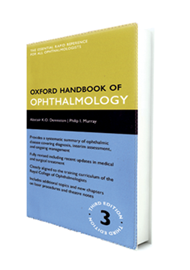The Oxford Handbook of Ophthalmology came out in 2006 and is now in its third edition. It is a valuable concise resource with over 1000 pages to cover initial assessment, diagnosis and management of a comprehensive range of ophthalmic problems. Its small size makes it easy to store and carry around, especially for those in training and as a reference source for subjects outside the specialty for consultants.
The new version has drafted further expertise to cover many topics, including Professor James Wolffsohn (of Aston). The new edition has been revised to reflect the continuing advances in knowledge and treatments in the last few years. The book is well laid out with good organisation of topics. There are 27 chapters.
The first chapter covers clinical skills including refraction, assessment of vision in children and extraocular movements. There are numerous assessment boxes and algorithms, which makes information easy to access and learn. The macular degeneration chapter has been expanded to include the latest anti-VEGF regimes. Useful information from notes on non-accidental injury in the paediatric chapter to traumatic injury is useful for the eye casualty setting.
There is a chapter on theatre notes, which goes through ophthalmic instruments, sutures and also chapters on low vision, driving standards and registration, which are sections not well covered in other texts. Trainees will benefit from having this information to hand. There is a chapter on aids to diagnosis to help formulate differential diagnoses on cases and the last pages on this chapter have a well-laid summary diagram of visual fields. It has a holistic approach to include medical emergencies, life support flow charts, and evidence based medicine.
This book may most be used by ophthalmologists but would be of benefit to anyone involved with ophthalmic patients, from optometrists to nurse practitioners in the field. It has become the book of choice for most trainees when taking postgraduate examinations. It is the ideal quick reference handbook, my only criticism would be that ophthalmology is a visual specialty and the book could benefit from having more pictures.




